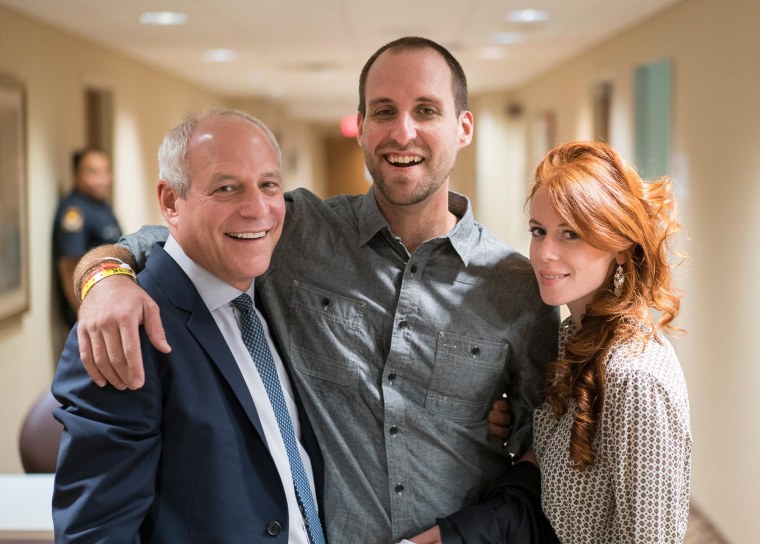Being young and healthy helped Ashoka Mukpo pull through Ebola, but he’ll be weak for months, doctors who treated him said Wednesday.
Mukpo, a freelance journalist and camera operator who was on contract with NBC News when he got sick in Liberia, left the biocontainment unit at Nebraska Medical Center in Omaha after getting two blood tests a day apart that cleared him of the virus.
“After enduring weeks where it was unclear whether I would survive, I’m walking out of the hospital on my own power, free from Ebola. This blessing is in no small measure a result of the world class care I received at the Nebraska Medical Center,” Mukpo said in a statement.
Mukpo will also give exclusive interviews to NBC News.
“Obviously, he has done well and we are very happy about it,” said Dr. Angela Hewlett, who helped lead his treatment. “We are not sure what made him better. We are just glad he’s better.”
Mukpo, who arrived at the hospital Oct. 6, got the supportive care that’s become standard in the United States — regular testing and replacement of compounds called electrolytes, which get flushed out of the body during the severe vomiting and diarrhea that mark the mid-stages of Ebola disease. The treatment is similar to what works for cholera.
“We are not sure what made him better. We are just glad he’s better.”
Mukpo also got an experimental pill called brincidofovir as well as serum from Ebola survivor Dr. Kent Brantly.
“Thank you to Dr. Kent Brantly, whose generous blood donation played a pivotal role in my recovery. May his health flourish and his compassion be known to all,” Mukpo said.
The Centers for Disease Control and Prevention is testing samples of blood taken from Mukpo and other Ebola patients to see if the tests can show which treatment affects the levels of virus in the blood, but there’s not much information yet, says Dr. Phil Smith, who led the treatment team.
The same team also treated medical missionary Dr. Rick Sacra, who also was infected in Liberia and was released in September. Hewlett said the team learned from that experience and made some small changes to streamline the process with Mukpo — for instance, putting a lab inside the containment zone to make it quicker to run tests and to reduce the amount of medical waste.
Smith said Mukpo may be weak for several months, but he recovered more quickly than Sacra did, probably because Mukpo, 33, is 20 years younger than Sacra. He’ll also be vulnerable to infection. Sacra was hospitalized with pneumonia earlier this month.
“With this patient gone and before we get another patient, I think we are going to use that time to share that knowledge as best we can with the rest of the world,” Smith said.
It’s a labor-intensive effort to take care of a patient with Ebola. Several separate rooms were designated for suiting up, running lab tests and taking off the personal protective equipment needed to keep doctors, nurses and technicians from getting infected.
Smith estimates that, at any given time, 10 people can be on duty taking care of an Ebola patient. At least one caregiver such as a nurse is in the room with the patient at all times, and someone is always posted in the hallway to make sure protective gear gets taken off correctly.
"Nobody deserves to die under the circumstances that have existed in West Africa since this outbreak began."
Linens and other materials are decontaminated at high temperatures in an autoclave before they leave the facility, and all staff involved in Mukpo’s care will monitor their temperatures for 21 days.
Mukpo asked people to think of people in Liberia, Sierra Leone and Guinea, where the World Health Organization now says nearly 10,000 people have been infected and 4,800 have died.
“I saw many haunting images in Liberia that I will carry through my life. Nobody deserves to die under the circumstances that have existed in West Africa since this outbreak began,” Mukpo said.
“I hope our global community will ramp up its efforts to curtail the epidemic but also to save the lives of the sick. I know firsthand that this disease is treatable and hope that some approximation of the care I received can be given to sick Africans. My prayers are with the Liberian, Sierra Leonean, and Guinean people.”
